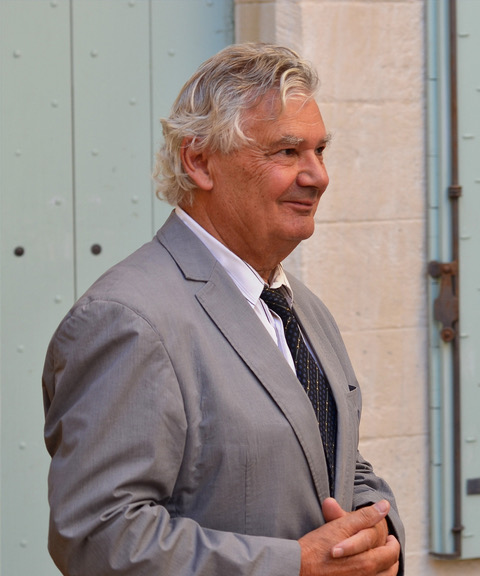Yves Dauge was President of the ACCR from 2010 to 2018. A former mayor and senator of Chinon, he became involved in heritage issues at a very early stage. He was appointed to work on the "Plan Coeur de Ville" in 2015 under the Valls government.
It was Alain Rafesthain, President of the Cher département, whom I knew when he was President of the Centre-Val de Loire region, who offered me the presidency of Noirlac Abbey... Together with Jean-Pierre Saulnier, his vice-president, he wanted to turn Noirlac into a cultural project for the region, moving on from a festival to a permanent cultural development initiative. The idea of a Centre culturel de rencontre appealed to them. That was how the CCR adventure began for me, with these highly motivated and competent elected representatives, and with Paul Fournier, the project manager who was quickly hired and who imposed himself on everyone.
Some time later, when Jean Maheu, Chairman of the ACCR, had announced his decision to leave, Francis Maréchal, Olivier Corpet and François de Banes Gardonne came to see me at the Senate to ask me to take over from him. I'd like to thank them for their confidence, and for the important role they played, particularly in those early years. I was just starting to get to know the network, but I felt I needed to take things to the next level. We needed to reorganise, re-establish relations with the Ministry and with our members, sort out financial problems... and move!
After Jean-Noël Mathieu's departure, I thought of Isabelle Battioni, whom I had spotted! She had the experience of a centre and the qualities to become my network manager. Together with the three ‘solicitors’, who are always very present, we thought that Isabelle would be an opportunity for all of us. She agreed, and Alain Brunet, her chairman, whom I didn't know at the time, also supported us, and friendships were forged between us. Friendships that have developed with all the directors of the Centres. Over the years, some have left, others have moved away, but many have joined us and our relationships have grown closer. Alongside the older members, the founders, we have been lucky enough to receive new applications, even if not all of them have been successful, because setting up a project and mobilising human and financial resources is difficult and time-consuming. Today, all the members, and even the Ministry, are showing an interest in our network, which will continue to grow and diversify. It is this development movement that has supported us and enabled us to reach several milestones.
In this dynamic process, we should be grateful for the constant support of the Ministry, and in particular the General Secretariat with Jean-François Chantreau, then General Secretary Christopher Miles, and Carole Spada today with Hervé Barbaret, Arnaud Roffignon, Maryline Laplace and Anne-Christine Micheu. These two General Secretaries deserve special thanks. We had a very special moment at the 2010 meeting of the National Commission at Royaumont, with the Minister Frédéric Mitterrand, Jacques Rigaud and Jacques Legendre in attendance. I owe a special thank you to Frédéric Mitterrand, who had met us with Isabelle Battioni some time before and showed a keen interest in what we were doing. Following him, all the ministers have constantly supported us, insisting on our mission in the field of artistic and cultural education. This national commission in 2010 was the stage when we gained confidence and were recognised as a player in the State's cultural policy. The State considers that it is working with us, with the support of local authorities, to ensure that culture has a vital presence in areas that are often very isolated and do not benefit from the presence of major cultural facilities in urban centres. This relative isolation forces us to be in constant contact with local people and associations, and also forces us to build our projects with other players. We are less involved in ‘representation’ than in the ongoing action of a cultural development approach.
We have gradually taken this first step. It has led us to reinvent our Charter to make it more open and less confined to a monumental heritage, more sensitive to the expectations of the region and its inhabitants and, of course, to the expectations of local authorities. These changes were marked by our annual meetings at the Chartreuse de Villeneuve-lès-Avignon, where the spirit and the collective work of everyone involved really took shape. It was at the 2015 meeting, attended by Jean-Jack Queyranne, President of the Rhône-Alpes region, and Christopher Miles, Secretary General, that the decision was taken to propose that the CCRs be included in the draft Loi LCAP. This is a major new step in the recognition of the network, which will now determine our new position vis-à-vis government departments and local authorities.
It is this final stage after ten years of presidency and work with Isabelle Battioni that opens up new prospects for work with all the members and with the candidates that we must support. While we have taken on new dimensions, we must remain aware of the ongoing challenges we face, because while the number of our members gives us greater strength and clarity, the fact remains that each of us is still subject to severe financial constraints and, above all, remains dependent on our ability to renew ourselves and demonstrate our creativity and economic performance. Yes, in this respect we really are a unique and indispensable network! On the financial question, we have obtained from the Minister Audrey Azoulay, and from the Secretary General, that an effort be made for the new centres that are less well endowed than the old ones. I had asked for this effort to be spread out over time, and to allow us over 4 years to increase funding via the DRACs by up to two million euros. This effort was made in 2017 and 2018, and will have to be continued in 2019 and 2020. We are aware of the budgetary constraints and we very much appreciate these increases in funding, which we define in close collaboration with the Secretary General and the DRACs.
I'm not forgetting the international dimension: firstly, Europe, where our approach must be to build projects from the centres themselves. The idea of a European network can only emerge from agreements reached on the ground. Some are doing it, but we all need to think about it! In China, we have a good agreement and remarkable support from the Chinese People's Association for Friendship with Foreign Countries (APCAE). It's a great success. We are going to continue beyond the first two creations, with the remarkable commitment of many of you and the support of the Embassy. In India, we have a great prospect for a relationship in Jaipur at the initiative of Minja Yang, former head of the UNESCO World Heritage Committee and UNESCO representative in India for 4 years. In Africa, several projects are in the pipeline in Senegal, Benin and Tunisia. We know that this is a government priority. Finally, we want to strengthen our links with the Institut Français and the Alliances Françaises. Agreements bind us and encourage us to keep the embassies, institutes and alliances constantly informed of our actions so that France abroad is always in good working order and not dispersed.
To carry out our local actions and find in the network that we form the collective strength that everyone needs, we have a twofold obligation. Firstly, we need to be supported by the local authorities, municipalities, inter-municipalities, the département and the region. We must be a recognised tool in the service of their own policies. Secondly, we need to be able to build up a relationship of trust with the DRACs, and maintain concrete links with the departments and their teams around projects that meet ministerial objectives. The development of our network has been a major concern for me and Isabelle over the past ten years. This movement must continue steadily, but cautiously, in the knowledge that while the criterion of the quality of the project is decisive, we cannot commit ourselves if we do not have a local authority to provide the essential funding.

